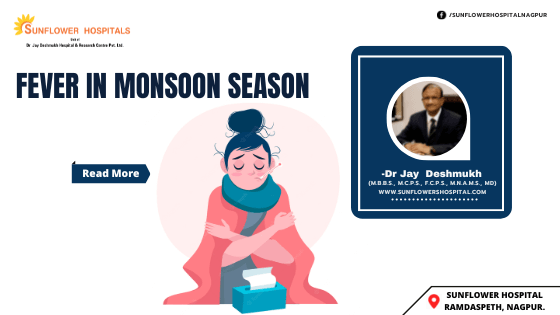How to suspect viral fevers?
Most of the time, mild to moderate fever with cold, running nose, headache and body aches are common symptoms. Antibiotics should be avoided in such situations. Simple Paracetamol or Aspirin may suffice. Short-duration fevers may not require investigations. However early evaluation may be required in Diabetics, the elderly, individuals with kidney and liver failure, and those with underlying heart disease and in pregnancy. Most viral fevers may go on for up to 3 days and may recover on their own.
What about Dengue fever?
Individuals with Dengue fever may have severe headaches, body aches, and low platelets. Skin rashes and extreme exhaustion are common features. Low blood pressure and platelets below 1 lac may necessitate close observation in a hospital. Prevention by avoiding mosquito bites and avoiding stagnant water at home and in the surroundings is necessary. Early diagnosis is an important feature in the management of this viral mosquito-borne infection.
What about malarial fever?
Falciparum and Vivax malaria are the common types. These parasitic diseases are spread by mosquito bites. Fever accompanied by chills which may come daily or on alternate days associated with headaches, body aches, and exhaustion is the common features. Falciparum malaria can lead to sudden serious complications and thus a blood smear and antigen tests are necessary. Your doctor may give antibiotics are necessary.
What about influenza?
This is a respiratory virus and spreads quickly. Common cold-like symptoms are common. However, few may land up with viral pneumonia with low oxygen saturation. This requires urgent hospitalization for close monitoring and supportive care. Throat swab examination and certain blood tests help to diagnose this condition. In individuals with low immunity, this may cause severe life-threatening illnesses. Annual vaccination Fever in monsoon season is a very common occurrence. Most of them are viral infections. These viral infections are known to spread rapidly in educational institutions and offices. It is important to understand the common fevers in this season and take prompt action as few of them can take an unpleasant turn. you anti-malaria therapy in absence of a positive blood test for malaria in situations where the index of suspicion is high.
What about typhoid fever?
High-grade fever from 101 to 104 degrees Fahrenheit is common. Pain in the abdomen, loose stools, headache, and body ache are common. This is a water and food-borne infection. Avoiding food from unhygienic sources can prevent this condition. Fever generally remains for a week or more. Blood counts and Widal test can diagnose typhoid fever. The earliest diagnosis can be had with a blood culture. Specific antibiotics help. Nowadays the concern is drug-resistant cases wherein a combination of
against the influenza virus can certainly lower the severity of this illness.
What about leptospirosis?
This uncommon bacterial infection is transmitted from animals to human beings. This gains entry through breaks in the skin through contaminated water. Infected animals excrete in water and this water if entered through a breached skin can cause leptospirosis. The animals responsible are rodents, dogs, and fan animals. Farmers, Veterinarians, sewage workers, and slaughterhouse workers are at increased risk. Symptoms may appear after 2 weeks to 3 weeks. One can get a high-grade fever, headache, muscle ache, vomiting, diarrhea
jaundice, and skin rash. Blood tests can confirm the diagnosis. Early antibiotic therapy helps to cure leptospirosis.
What are the dangerous symptoms of fever?
Persistent diarrhea and vomiting, and high-grade fever over 102 degrees particularly in very young and the elderly, are associated with low blood pressure breathless. ness with persistent cough and disorientation should make you approach a doctor and get hospitalized. If you have diabetes, uncontrolled hypertension, underlying heart or kidney disease, or cancer chemotherapy then early medical assessment and treatment are suggested. Those on steroids or other immunosuppressants for arthritis, lupus, or after kidney, liver, or dialysis need to be careful.
What are the general measures to avoid infections during monsoon season?
Homemade food is the best. Avoid food from roadside ven-dors if hygienic procedures are doubtful. Wash vegetables and fruits thoroughly before consumption. Infants and the elderly and those with medical conditions should have boiled water to drink. Use face masks as long as possible. Prevent mosquito bites at all costs. Avoid stagnation of water in your house or surroundings. If someone has a cold, running nose, keep a distance from him. Your annual flu shot should be taken. Fever in monsoon is a preventable illness. Due to precautions against mosquito bites, having hygienic food and water and avoiding close contact with individuals with the common cold is important.


